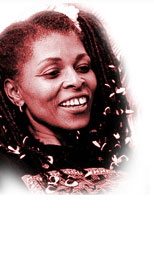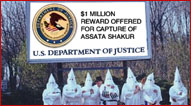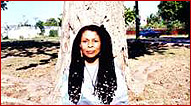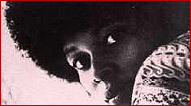


Search Site |
|

|
U.S., keep your hands off Assata! Interview with Assata
Shakur, Part 1 Part
2 She is featured in Afrikan Anti Terrorism Month because she is a warrior who stood up for Black people, and it almost cost her life on more than one occasion. This revolutionary elder has been shot, tortured, imprisoned and split up from her family because of her political beliefs and affiliations and has been on the run for more than 20 years where Amerikkka hasn’t been able to touch her. This is the interview with a Sista-General who smashed in a revolutionary manner when the going got tough. Check her out … Q: You came to Cuba how soon after (escaping from prison)? A: Five years later, in 1984. Q: I know it’s probably out of bounds, but where were you during the intervening years? A: I was underground. But I don’t talk about that period. To do so would put a lot of people who helped me in jeopardy. Q: Right, I hear you. You’ve talked about adjusting to Cuba, but could you talk a bit about adjusting to exile. A: Well, for me exile means separation from people I love. I didn’t, and don’t, miss the U.S., per se. But black culture, black life in the U.S., that African American flavor, I definitely miss. The language, the movements, the style - I get nostalgic about that. Adjusting to exile is coming to grips with the fact that you may never go back to where you come from. The way I dealt with that, psychologically, was thinking about slavery. You know, a slave had to come to grips with the fact that “I may never see Africa again.” Then a maroon, a runaway slave, has to - even in the act of freedom - adjust to the fact that being free or struggling for freedom means, “I’ll be separated from people I love.” So I drew on that and people like Harriet Tubman and all those people who got away from slavery. Because, that’s what prison looked like. It looked like slavery. It felt like slavery. It was black people and people of color in chains. And the way I got there was slavery. If you stand up and say, “I don’t go for the status quo.” Then “we got something for you. It’s a whip, a chain, a cell.” Even in being free, it was like, “I am free, but now what?” There was a lot to get used to. Living in a society committed to social justice, a third world country with a lot of problems. It took a while to understand all that Cubans are up against and fully appreciate all they are trying to do. Q: Did the African-ness of Cuba help? Did that provide solace? A: The first thing that was comforting was the politics. It was such a relief. You know, in the States you feel overwhelmed by the negative messages that you get and you just feel weird, like you’re the only one seeing all this pain and inequality. People are saying, “Forget about that. Just try to get rich. Get your own. Buy. Spend. Consume.” So living here was an affirmation of myself. It was like, “Okay, there are lots of people who get outraged at injustice.” The African culture I discovered later. At first I was learning the politics, about socialism - what it feels like to live in a country where everything is owned by the people, where health care and medicine are free. Then I started to learn about the Afro-Cuban religions - the Santaria, Palo Monte, the Abakua. I wanted to understand the ceremonies and the philosophy. I really came to grips with how much we - Black people in the U.S. - were robbed of, whether it’s the tambours, the drums or the dances. Here, they still know rituals preserved from slavery times. It was like finding another piece of myself. I had to find an African name. I’m still looking for pieces of that Africa I was torn from. I’ve found it here in all aspects of the culture. There is a tendency to reduce the African-ness of Cuba to the Santaria. But it’s in the literature, the language, the politics. Q: When the USSR collapsed, did you worry about a counter-revolution in Cuba and, by extension, your own safety? A: Of course. I would have to have been nuts not to worry. People would come down here from the States and say, “How long do you think the revolution has - two months, three months? Do you think the revolution will survive? You better get out of here.” It was rough. Cubans were complaining every day, which is totally sane. I mean, who wouldn’t? The food situation was really bad, much worse than now - no transportation, eight-hour blackouts. We would sit in the dark and wonder, “How much can people take?” I’ve been to prison and lived in the States, so I can take damn near anything. I felt I could survive whatever - anything except U.S. imperialism coming in and taking control. That’s the one thing I couldn’t survive. Luckily, a lot of Cubans felt the same way. It took a lot for people to pull through, waiting hours for the bus before work. It wasn’t easy. But this isn’t a superficial, imposed revolution. This is one of those gut revolutions. One of those blood, sweat and tears revolutions. This is one of those revolutions where people are like, “We ain’t going back on the plantation, period. We don’t care if you’re Uncle Sam, we don’t care about your guided missiles, about your filthy, dirty CIA maneuvers. We’re this island of 11 million people, and we’re gonna live the way we want and if you don’t like it, go take a ride.” And we could get stronger with the language. Of course, not everyone feels like that, but enough do. Q: What about race and racism in Cuba? A: That’s a big question. The revolution has only been around 30-something years. It would be fantasy to believe that the Cubans could have completely gotten rid of racism in that short a time. Socialism is not a magic wand: wave it and everything changes. Q: Can you be more specific about the successes and failures along these lines? A: I can’t think of any area of the country that is segregated. Another example, the Third Congress of the Cuban Communist Party was focused on making party leadership reflect the actual number of people of color and women in the country. Unfortunately, by the time the Fourth Congress rolled around, the whole focus had to be on the survival of the revolution. When the Soviet Union and the socialist camp collapsed, Cuba lost something like 85 percent of its income. It’s a process, but I honestly think that there’s room for a lot of changes throughout the culture. Some people still talk about “good hair” and “bad hair.” Some people think light skin is good, that if you marry a light person you’re advancing the race. There are a lot of contradictions in people’s consciousness. There still needs to be de-Eurocentrizing of the schools, though Cuba is further along with that than most places in the world. In fairness, I think that race relations in Cuba are 20 times better than they are in the States and I believe the revolution is committed to eliminating racism completely. I also feel that the special period has changed conditions in Cuba. It’s brought in lots of white tourists, many of whom are racists and expect to be waited on subserviently. Another thing is the joint venture corporations which bring their racist ideas and racist corporate practices - for example, not hiring enough blacks. All of that means the revolution has to be more vigilant than ever in identifying and dealing with racism. Q: A charge one hears, even on the left, is that institutional racism still exists in Cuba. Is that true? Does one find racist patterns in allocation of housing, work or the functions of criminal justice? A: No. I don’t think institutional racism, as such, exists in Cuba. But at the same time, people have their personal prejudices. Obviously these people, with these personal prejudices, must work somewhere and must have some influence on the institutions they work in. But I think it’s superficial to say racism is institutionalized in Cuba. I believe that there needs to be a constant campaign to educate people, sensitize people and analyze racism. The fight against racism always has two levels: the level of politics and policy, but also the level of individual consciousness. One of the things that influences ideas about race in Cuba is that the revolution happened in 1959, when the world had a very limited understanding of what racism was. During the 1960s, the world saw the black power movement, which I, for one, very much benefited from. You know “black is beautiful,” exploring African art, literature and culture. That process didn’t really happen in Cuba. Over the years, the revolution accomplished so much that most people thought that meant the end of racism. For example, I’d say that more than 90 percent of black people with college degrees were able to do so because of the revolution. They were in a different historical place. The emphasis, for very good reasons, was on black-white unity and the survival of the revolution. So it’s only now that people in the universities are looking into the politics of identity. Q: What do you think of the various situations of your former comrades? For example, the recent releases of Geronimo Pratt, Johnny Spain and Dhoruba Bin Wahad; the continued work of Angela Davis and Bobby Seale; and, on a downside, the political trajectory of Eldridge Cleaver and the death of Huey Newton? A: There have been some victories. And those victories have come about from a lot of hard work. But it took a long time. It took Geronimo 27 years and Dhoruba 19 years to prove that they were innocent and victimized by COINTELPRO. The government has admitted that it operated COINTELPRO, but it hasn’t admitted to victimizing anyone. How can that be? I think that people in the States should be struggling for the immediate freedom of Mumia Abu Jamal and amnesty for all political prisoners. I think that the reason these tasks are largely neglected reflects not only the weakness of the left, but its racism. On the positive side, I think a lot of people are growing and healing. Many of us are for the first time analyzing the way we were wounded - not just as Africans, but as people in the movement who were, and still are, subjected to terror and surveillance. We’re finally able to come together and acknowledge that the repression was real and say, “We need to heal.” I have hope for a lot of those people who were burnt out or addicted to drugs or alcohol, the casualties of our struggle. Given all that we were and are up against, I think we did pretty well.
|




